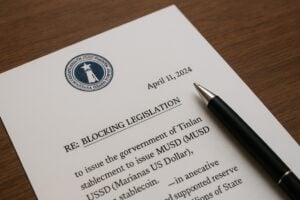With a letter dated April 11, Palacios has officially blocked the bill that would have allowed the local government of Tinian to launch MUSD (Marianas US Dollar), a stablecoin pegged to the US dollar and backed by cash reserves and US Treasury securities.
A historic opportunity missed for Tinian’s stablecoin MUSD
If it had been approved, the Marianas US Dollar would have represented the first case of a stablecoin issued by a government entity in the United States. Thus beating even the State of Wyoming, which has announced the launch of its own digital currency for July 2025.
It would not have been a simple experimentation. Tinian had in fact already defined its technological partner, Marianas Rai Corporation, based in the capital Saipan, and had chosen the blockchain eCash as its infrastructure, a fork of Bitcoin Cash born in 2021.
The objective was clear: to offer a digital payment system to support tourism, regulate online casinos, and position the island as a fintech hub of the Pacific.
All this in parallel with an important 1 billion dollar initiative by Google. Which involves laying submarine cables to improve connectivity between the USA, Tinian, and Japan.
In his veto, Governor Palacios did not directly speak out against the stablecoin, but criticized the entire regulatory framework of the bill.
The text, in fact, amended a local law to grant licenses to exclusively online casinos. Furthermore, between the lines, it also included the possibility for the treasurer of Tinian to issue and manage a digital token.
According to Palacios, the bill presented “several legal issues” and, in some passages, was potentially unconstitutional.
Furthermore, it was emphasized how the regulation of online gambling activity could not be effectively limited to the sole jurisdiction of Tinian. Thus leaving room for potential abuses and illegal activities.
According to him, there was a lack of a robust enforcement system, meaning a credible mechanism to control and prevent unauthorized gambling.
Tensions between decentralization and local jurisdiction
The case of Tinian brings attention back to an increasingly hot topic in the United States: which level of government has the right to issue a digital currency?
And to what extent can a municipality or a municipal authority regulate activities that, by their nature (such as online casinos or stablecoins), easily surpass geographical and legal boundaries?
In this context, the stablecoin MUSD would have been legally pegged to physical reserves in dollars and government securities, but technically issued on a public blockchain accessible from anywhere in the world.
A potentially explosive mix for a small local entity. The choice of technical infrastructure is also interesting: eCash, a network derived from Bitcoin Cash, focuses on decentralized governance and low-cost transactions.
The choice of this blockchain indicates that the MUSD project was designed for a real commercial adoption, and not as a simple experiment.
The bill had been proposed in February by the Republican senator Jude Hofschneider, former president of the senate of the Mariana Islands, and unanimously approved by the Tinian delegation on March 12. A clear political signal of local unity.
However, the governor’s veto has blocked the entire process. At the moment it is not clear if the bill will be modified and resubmitted.
However, it appears evident that to carry forward an initiative of this type, it will be necessary to directly involve the central government of the Commonwealth and, perhaps, also the USA Congress.
Conclusions: Tinian as a missed trailblazer
The story of Tinian shows how thin the boundaries between innovation, local autonomy, and federal jurisdiction are when it comes to stablecoin.
While cities and states in the USA explore the possibilities offered by digital currencies, the case of the Northern Mariana Islands represents an important precedent.
The MUSD project had the potential to transform a small Pacific archipelago into a laboratory of decentralized finance backed by real reserves, offering new economic opportunities to a community with strong tourist ties and a strategic position.
But, for now, the dream stops here. Waiting for, perhaps, other jurisdictions, larger or better coordinated, to pick up the baton left by Tinian.


